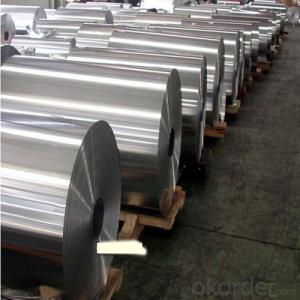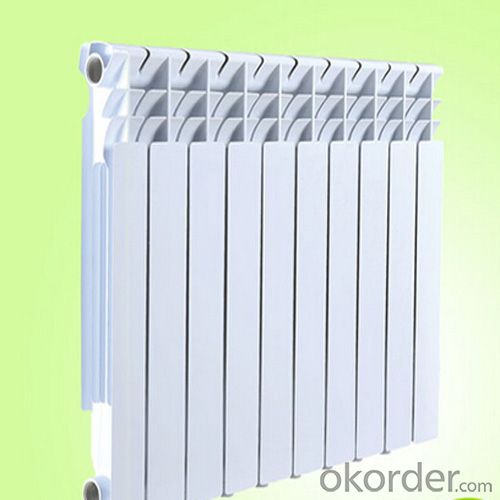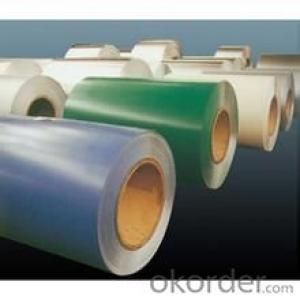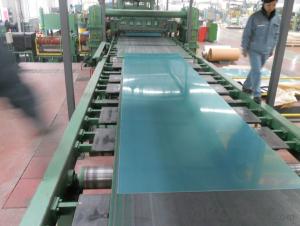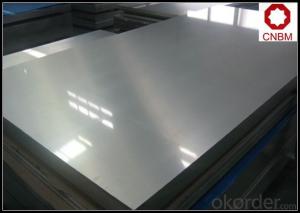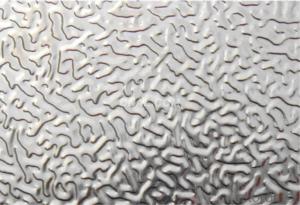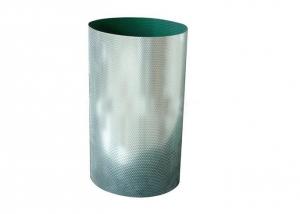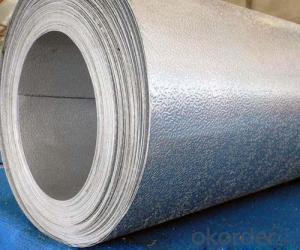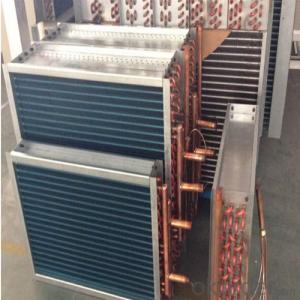Stucco Embossed Aluminum Coil for High Performance Refrigeration Aluminum Condenser Coil
- Loading Port:
- Shanghai
- Payment Terms:
- TT OR LC
- Min Order Qty:
- 5 m.t
- Supply Capability:
- 10000 m.t/month
OKorder Service Pledge
OKorder Financial Service
You Might Also Like
Specification
1.Structure of Refrigeration Aluminum Condenser Coil Description:
They are widely used in construction and decoration, hardware and electric appliances manufacture,
automobile manufacture and other industrial and civil purposes, such as electronic capacitor, rice
cooker, refrigerator, computer casting, lamp shade, air-conditioner, cosmetics cover and box, air-
conditioner radiator, inner container of disinfecting cabinet, ceiling board, automobile motherboard,
cover board and top board, etc.
2.Main Features of Refrigeration Aluminum Condenser Coil :
1). The heat exchangers have a wide rang of plications such as: Window, Split and package AC systems;
2). Commercial Refrigeration Systems (Kitchen refrigerator, bottle cooler, deep freezer, milk tank, etc);
3). Industrial Refrigeration Systems (Printing machine, Colling machine, etc);
4). Automobile-Buses / Car air conditioning;
5). Railway air-conditioning an Marine air-conditioning;
6). Special Application Coils.
3. Refrigeration Aluminum Condenser Coil Images:
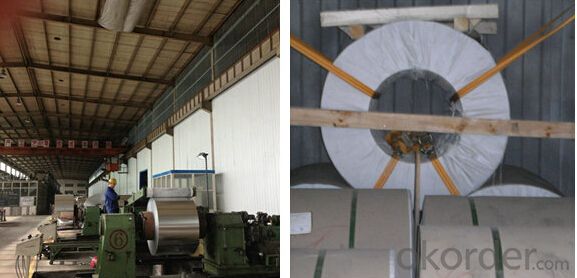
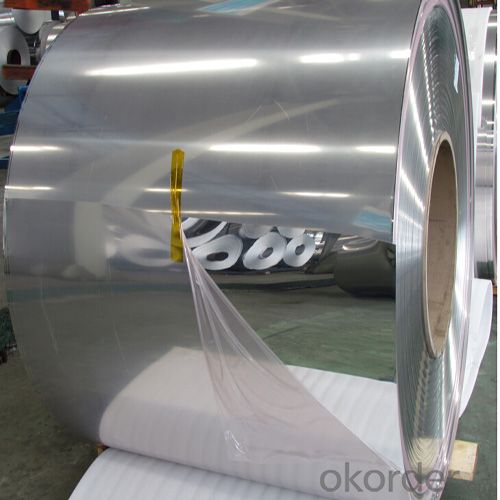
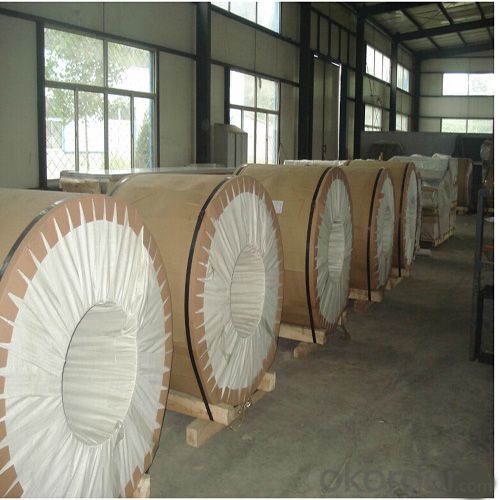
4. Refrigeration Aluminum Condenser Coil Specification:
| Fin Pattern | Copper Tube O. D. (mm) | Row Space(mm) | Hole Space(mm) | Fin Thickness(mm) | Fin Space(mm) | ||||
| Flat fin | Sine wave with blade fin | Smooth sine wave fin | Window fin | Sesamoid fin | |||||
| A | 7 | 12.7 | 21 | 0.105 | / | / | 1.3 | 1.3 | / |
| B | 7 | 13.2 | 17.6 | 0.105 | / | / | 1.3 | 1.3 | / |
| C | 7 | 12.7 | 20.4 | 0.105 | / | / | 1.3~1.8 | 1.3~1.8 | / |
| D | 7.94 | 15.88 | 25.4 | 0.105 | 1.8~3.0 | 1.8~3.0 | 1.8~3.0 | 1.8~3.0 | / |
| E | 9.52 | 22 | 25.4 | 0.105~0.15 | 1.6~3.2 | 1.6~3.2 | 1.6~3.2 | 1.6~3.2 | / |
| F | 9.52 | 22 | 25.4 | 0.18~0.4 | 3.5~6.35 | / | / | / | / |
| G | 9.52 | 21.65 | 25 | 0.105~0.18 | 1.6~3.2 | 1.6~3.2 | 1.6~3.2 | 1.6~3.2 | / |
| H | 9.52 | 21.65 | 25 | 0.15~0.24 | 3.2~6.35 | 3.2~6.35 | 3.2~6.35 | / | / |
| I | 12.75 | 27.5 | 31.75 | 0.115~0.15 | 1.5~3.5 | 1.5~3.5 | 1.5~3.5 | 1.5~3.5 | 1.6~3.2 |
| J | 15.88 | 33 | 38.1 | 0.115~0.15 | 1.5~4.0 | 1.5~4.0 | 1.5~4.0 | / | / |
| K | 15.88 | 34.64 | 40 | 0.115~0.15 | / | 2.6~3.5 | 2.6~3.5 | / | / |
5.FAQ
Q1.How long have you been in this product?
A1:More than 10 years.
Q2. What's the minium quantity(MOQ)?
A2. 5 Metric tons
Q3. How long is shipping time?
A3. 7 (ready-made products)-25 days(OEM)
Q4. How do you guarantee the quality?
A4. 1. Cooperating and Exchaning experience with sevral quoted aluminum companies
2. Japanese and Swiss production line and skilled works (regular training and testing)
3. more than 10 years production experience.
Q5. Do you have after sale service?
A5. Yes. Any quality problem occurs within one year, pls take photoes,we will be responsible.
- Q: Explain the distinctions among various welding equipment used specifically for joining aluminum coils.
- <p>Different types of welding equipment for aluminum coils include Gas Tungsten Arc Welding (GTAW), Gas Metal Arc Welding (GMAW), and Resistance Welding (RW). GTAW, also known as TIG welding, uses a non-consumable tungsten electrode and produces high-quality welds with minimal distortion. GMAW, or MIG welding, uses a continuous wire feed as the electrode and is faster but may not be as precise. Resistance Welding involves using electrical current to heat the metals at the joint, which is quick and efficient but not suitable for all aluminum alloys. Each method has its advantages and is chosen based on factors like weld quality, speed, and the specific aluminum alloy being welded.</p>
- Q: What role does the powdered aluminum play in this reaction?
- Aluminum powder is a powerful and energetic reducing agent. The Iron(iii) ions have a greater electron affinity than metallic aluminum does, so it will easily borrow electrons from the aluminum to become metallic iron. The total reaction is Fe2O3 + 2Al === Al2O3 + 2Fe. It's important to note that the oxygen in the iron(iii) oxide doesn't really participate in this single replacement reaction, as it is not chemically changed. Fe2O3 is an ionic compound which consists of Fe[3+] ions and O[2-] ions. So more correctly Fe[3+) + Al + 3O[2-] === Al[3+] + Fe + 3O[2-] The ionization energy for aluminum is also greater than for iron, so this reaction generates a lot of heat, enough heat to produce 2,500-3,500 degree C molten iron. In fact, aluminum can reduce many different metal oxides in the same manner. So the thermite reaction can be used to produce a number of metals like copper, calcium, manganese, chromium, or even titanium.
- Q: What are the different color options for pre-painted aluminum coils?
- The different color options for pre-painted aluminum coils are extensive and can include a wide range of shades such as white, black, gray, blue, red, green, yellow, and many more. The options are virtually limitless, allowing for customization and versatility in various applications.
- Q: A piece of aluminum foil 0.550 mm thick and 1.00 cm square is allowed to react with bromine to form aluminum bromide?a) How many mole of aluminum were used? ( The density of aluminum is 2.699 g/cm3.)I keep getting the same answer which I know is wrong. I used a formula to get the volume and then the mass to get the moles, but maybe this is wrong. Could someone explain the process. I got 4.32 x 10-1 mol Al, but the answer is 5.50 x 10-3 mol Al.
- volume= 0.0550 cm x 1.00 cm^2= 0.0550 cm^3 gms Al= 2.699 g/cc x [vol] 0.0550 cc = 0.148 g moles Al = [grams]/[mole wt] mol wt=26.98 so 2.699[g/cc] x 0.0550[cc] / 26.98 =0.00550 or 5.50x 10^-3 to 3 sig fig units cancel and gram-moles is final unit.
- Q: What is the typical yield strength-to-density ratio for aluminum coils?
- The typical yield strength-to-density ratio for aluminum coils can vary depending on the specific grade of aluminum being used. However, in general, aluminum has a relatively high strength-to-density ratio compared to many other metals. This means that it can provide good mechanical properties while still being lightweight. For example, the most commonly used grade of aluminum for coils, 3003 aluminum, typically has a yield strength-to-density ratio of around 0.53 MPa•m^3/kg. This means that for every unit of density (mass per unit volume), the material can withstand approximately 0.53 megapascals (MPa) of stress before it starts to deform permanently. Other high-strength aluminum alloys, such as 5052 or 6061, can have even higher yield strength-to-density ratios, reaching up to 0.6 MPa•m^3/kg or more. These alloys are often used in applications where higher strength and durability are required, such as in aerospace or automotive industries. Overall, the yield strength-to-density ratio of aluminum coils is typically quite favorable, making aluminum a popular choice for a wide range of applications that require both strength and lightweight properties.
- Q: What precautions should we take to maintain health while using aluminum coils?
- <p>To protect our health when using aluminum coils, it's important to ensure that the coils are used in a manner that minimizes the release of aluminum into the environment or food. This can be achieved by avoiding high heat, as aluminum can leach more easily into food at high temperatures. Use aluminum coils in well-ventilated areas to minimize inhalation of fumes. Additionally, it's crucial to clean the coils properly to remove any residue that could contain aluminum. Regularly inspect the coils for any signs of wear or damage, as this can increase the risk of aluminum exposure. Finally, consider using alternatives to aluminum coils, such as stainless steel or cast iron, which are less likely to release harmful substances.</p>
- Q: I am a college student living in a private apartment and I use up lots of aluminium foils to cook and eat. I use aluminium foils as plates because I am too lazy to clean plates. I want to know how environment-unfriendly i am for doing so. How bad am I compared to the guy who keeps on drinking from cans without recycling them?
- Are you recycling them? If so it could be quite interseting as you are not using detergent and water to wash up? Who knows? How bad do you feel? I imagine that it's not great in the big scheme of things as re-using is the best option before re-cycling.
- Q: Can aluminum coils be used in the production of military equipment?
- Indeed, the utilization of aluminum coils in the manufacturing of military equipment is possible. The utilization of aluminum, a lightweight and long-lasting substance, provides numerous benefits for military applications. Its high strength-to-weight ratio renders it a popular choice for constructing military vehicles, aircraft, and naval vessels. Aluminum coils possess the capacity to be molded into diverse shapes and sizes, making them adaptable for fabricating various components such as armor plating, weapon systems, and structural parts. Furthermore, aluminum exhibits commendable resistance to corrosion, a crucial attribute for military equipment operating in harsh environments. In general, aluminum coils are a dependable and extensively employed material in the production of military equipment.
- Q: I go on a trip once a year with a group of lets say 10 people, we go for 7 nights and consume on average approx 120 cans of beer each (throughout the week). We have a fire burning the whole time in a hole that we dig approx 1ft deep, then we dispose of each can in the fire and let them melt down never thinking about them again. That's approx 1,200 cans that melt in the one fire hole.Will the aluminum have an affect on the soil? does anyone know what sort of damage this can cause? and for what distance / area around the fire might be affected?The theory amongst the group is that cans do not hurt anything so that's why they take cans instead of glass.Thanks
- Aluminum is very reactive in air and will form a layer of aluminum oxide around the outside of any piece. This oxide layer is very stable which is why aluminum doesn't corrode. Since your block of aluminum will be totally oxidized being in a fire, it's inert and just going to sit in the hole for the foreseeable future. The burning paint might not be healthy to breath but that's about the only hazard. Most common soil is a mixture of aluminum, carbon and silica compounds anyways so you aren't even adding anything particularly exotic. Alternatively, you could bring along a couple fifths of whiskey. It's lighter and has less packaging so it's the environmentally friendly way to get drunk.
- Q: I know this question is not so bright, but I am very curious why do we recycle aluminum cans? Is it that they are not biodegradable?
- We recycle cans as to save energy (and money) as the processing of aluminum cans from raw materials is very energy intensive, thus remelting them down and processing new aluminum products reduces energy use.
Send your message to us
Stucco Embossed Aluminum Coil for High Performance Refrigeration Aluminum Condenser Coil
- Loading Port:
- Shanghai
- Payment Terms:
- TT OR LC
- Min Order Qty:
- 5 m.t
- Supply Capability:
- 10000 m.t/month
OKorder Service Pledge
OKorder Financial Service
Similar products
Hot products
Hot Searches
Related keywords
